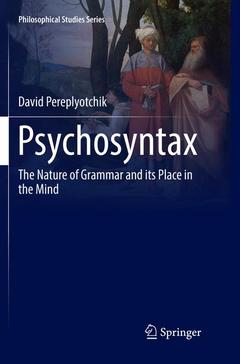Description
Psychosyntax, 1st ed. 2017
The Nature of Grammar and its Place in the Mind
Philosophical Studies Series, Vol. 129
Author: Pereplyotchik David
Language: English
Subjects for Psychosyntax:
Approximative price 105.49 €
In Print (Delivery period: 15 days).
Add to cartPublication date: 08-2018
Support: Print on demand
Approximative price 105.49 €
In Print (Delivery period: 15 days).
Add to cartPublication date: 10-2017
Support: Print on demand
Description
/li>Contents
/li>Comment
/li>
Chapter 1. The Ontology of Language and the Methodology of Linguistics.- Chapter 2. Cognitivism and Nominalism in the Philosophy of Linguistics.- Chapter 3. E-Language and I-Language.- Chapter 4. Language Acquisition and the Explanatory Adequacy Condition.- Chapter 5. Mental Phrase Markers in Sentence Processing.- Chapter 6. Two Attempts to do without Mental Phrase Markers.- Chapter 7. Representation, Embodiment, and Subpersonal States.- Chapter 8. Computational Models and Psychological Reality.- Chapter 9. The Psychological Reality of Syntactic Principles.- References.
Provides a detailed study of the co-evolution of syntactic theory and computational parsing models
Is an empirically informed philosophical account of the psychological reality of syntactic constructs
Presents an up-to-date discussion and philosophical critique of the subject




